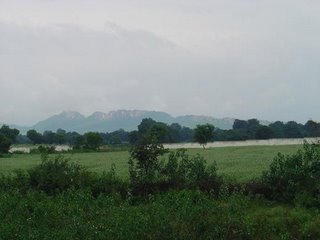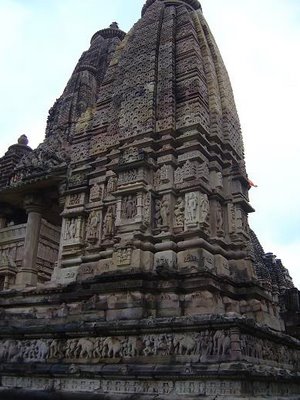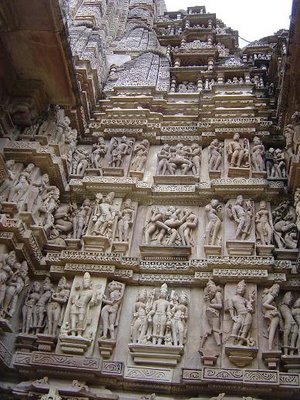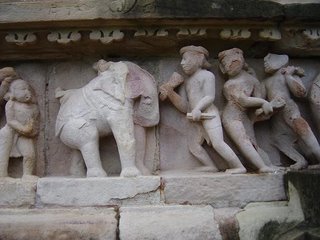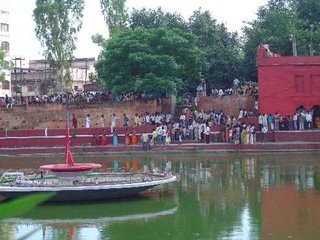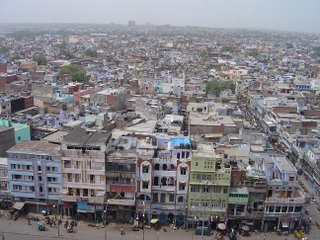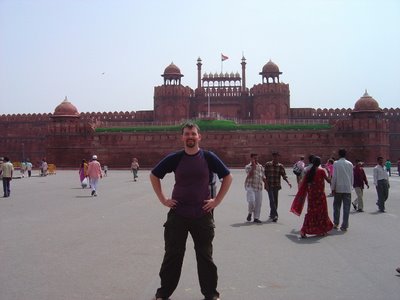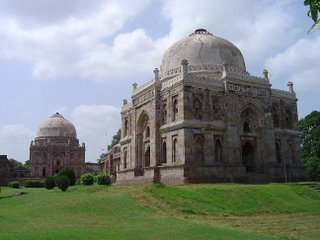America
 Our greatest cultural ambassador learned to wai when he came to Thailand.
Our greatest cultural ambassador learned to wai when he came to Thailand.I'm often depressed about how little Americans know about the outside world (my own lack of language skills included). Often other countries know just as little about us. Without exception that I've found, folks know Bush, and they know Iraq, and they know that America is where they'd like to go.
It's not that I'm embarrassed of my country, it's that I'm embarrassed of the face we put forward. Back home we have buckets of beauty, compassion, nobility and justifiable pride that just don't get the press that our tendency to bomb sandy places does. The Vietnamese, as I've mentioned, were excellent hosts, particularly to Americans. Still, I couldn't help walking around there thinking, "so, this would be the place we really messed up." I don't feel any personal guilt for the wrongs of the Vietnam war, but nonetheless it would have been so much easier to distance myself from them if we weren't busily repeating our folly in Iraq with such industry. The Vietnamese almost never mentioned either conflict, even when it would have been natural to do so.
Most folks, I think, are too polite to discuss politics, but sometimes the issue is forced. The other day I passed by one of the many t-shirt shops of Thamel, and realized that all of the custom lettering was being hand-sewn. How much for a handmade t-shirt? Different depend on design, sir. You show me and I give good price. The first thing that came into my head was just four words. Only 300 rupees? Deal.
 I mean, really. They guy who said that he'd fight the Iraq war the same way today, knowing what he knows now? They guy who said if you question the administration you're helping the terrorists, the one who insists that avowed secularist Saddam Hussein was in cahoots with religious fundamentalists of Al Queda? SHOT an old man in the face? You think he'd balk at a six week old tabby with some barbecue sauce? Think about it. Please, think of the kittens.
I mean, really. They guy who said that he'd fight the Iraq war the same way today, knowing what he knows now? They guy who said if you question the administration you're helping the terrorists, the one who insists that avowed secularist Saddam Hussein was in cahoots with religious fundamentalists of Al Queda? SHOT an old man in the face? You think he'd balk at a six week old tabby with some barbecue sauce? Think about it. Please, think of the kittens.When I left home I subscribed to what I now realize are some pretty silly superstitions. I had deliberately avoided bringing any t-shirts with English printing on them, just in case I wanted to blend in to the background. This of course only makes one stand out more, as then you are the only person, it seems, not wearing a t shirt with English printing. Everywhere in the world, something is hip just because it has English written on it. Amy's ultimate example was a little girl in China wearing a t-shirt that simply said "Eudora Welty" in a flowery script. I've also seen a large number of Yankees and Red Sox caps in places where I doubt the AL east is followed carefully. And English is not the language invented so that 11th century Norman warriors could make dates with Saxon barmaids, oh no, it's the language of America.
When I come across someone with a ballcap-Bush-Iraq knowledge of America, I have this intense desire to found a university on the spot. I desperately want them to know about something more than our worst leader and the greatest moral lapse of my generation. The injustice of this borders on the absurd- like a Nobel laureate or Macarthur grant recipient being introduced at a dinner party as "the guy with the explosive diarrhea problem."
I feel the urge to educate. I want them to know about Abraham Lincoln, Martin King, George Marshall. I want them to read John Irving, Steinbeck, Emerson. I want to give them headphones and make them listen to Miles Davis, Duke Ellington, Jimi Hendrix and even spin my Wilco records for them. They must see Winslow Homer, Cindy Sherman, Thomas Benton, Keith Haring and Andy Warhol. I want to teach them about the bill of rights, and let them listen to a dramatic reading of the Declaration of Independence, the Gettysburg Address, Kennedy's Inaugural, Barbara Jordan at the Watergate Judiciary Committee, Brown v. Board.
Instead, the T-shirt shop owner asks me about W.
"Bush good, Bush bad?"
"Bush very bad," I begin with a certain weariness, "Bush worst ever. He starts a war, in Iraq, for no reason."
"Ahhhh. But, sir, how he win? All American I meet say, Bush Bad, no like Bush. But he win, and then win again?"
This is the thing about the red state / blue state divide that you don't realize until you leave home: the passports are blue for a reason. Because the 700 Club viewers will apply for one only if called to do missionary work, the world gets almost as unrepresentative a view of Americans through me and my ilk as they do of America itself through Baywatch and nighttime soaps. I try to explain this, but it's tough to give a satisfactory answer that doesn't include the concepts of the electoral college or Karl Rove (if their English is better, I include these). It's also very tempting at this point to devolve into a caricature of red state America, something I'm usually able to resist.
People's fascination with America is understandable; many want very badly to move there because of the economic opportunity. Although it's interesting to note that according to the Economist, by almost every measurable standard, social mobility is now significantly greater in Europe than in the States, largely because of the tax codes post-Reagan (Clinton also did nothing about this) and the increasingly high barriers to advanced education. America has Hollywood, though, and even if the tax scheme is regressive, people will want to come and live the dream they've seen on DVD.
I know it's unrealistic for someone who's made the decision to emigrate for economic reasons to then hold up her nose at the border because of the foreign policy record of her potential new home. Just the same, any attraction to the United States in light of the war vaguely horrifies me. If I see a supermodel kicking a puppy to death, she's not really beautiful to me at that moment, whatever her other virtues might be. If I had very limited economic opportunities I'm sure I'd move towards the economic superpower too, but my mind conjures the image of poor city kids being drawn to the drug dealer as a role model just because of his potency, or the fact that he might give them a dollar to act as a lookout.
And of course, he needn't be the drug dealer. There's no reason why we need to be the country that bullies the world through the IMF and WTO, no need for us to be one of the only countries in the world that still manufactures and sells landmines, no destiny to be the greatest exporter of small arms, no mandate to boycott the Kyoto accords or block the adoption of a global jurisprudence system, no pressing urgency for us to invade Iraq or topple democratically elected leaders in the developing world. We have Coltrane's A Love Supreme, but what we export is daisy-cutters.
I have become aware of two broad categories lately: things that make America great, and things that make America good. The first category I've already described above and will be the core of the curriculum in my fantasy school. The second is the more mundane but no less significant. In Seim Reap, Amy and I talked to the owner of our hotel, a Philadelphian who had been living in Thailand for more than ten years. His wife, a native Thai, explained why she saw them eventually moving back to the States quite succinctly: "There, everything works."
In many parts of the world, "refund" is a bogeyman word used to frighten children, but most Americans think it's included in the five basic freedoms of the First Ammedment. If you get screwed on the deal, you can ask to speak to the manager, or if that fails, sue. That's not true everywhere. At home the traffic lights work, and if they don't you call the city and they fix it. There's a toilet, yes you can use it, and by god there will be paper. These are banal, and of course they're present in many countries, but such are the markings of a functioning society, and they are conspicuous in their absence.
In the Hitchhiker's Guide the Galaxy, Arthur Dent explodes when he learns that the epithet of the Earth is "Mostly Harmless". I'd want better for my home, but I'd cheerfully take that over "Bush, the conquest of Iraq and Britney Spears." One night in Chiang Mai I was talking to the singer in a Jazz club. She had gone to college in the states, and obviously loved African American Classical Music, as one of the DJs in Boston was fond of calling it. I was trying to express these same frustrations to her, pointing at the stage. "I want that to be what sweeps the world. I want America to be that place Jazz and comic books came from. I want this to be our legacy, not what our military does."
She sympathized- she didn't want Thailand to be sexual tourism, cheap manufactured goods (or coups, I would suspect) and spicy food. Homer-like, this of course made me want to eat some spicy Thai food at that moment, while I listened to the Thai take on the Cole Porter songbook. Jazz is by no means popular in Thailand; Chiang Mai has just the one venue for it compared to three Starbucks and uncounted 7-11's. Yet, there it was. And also, there were my rice noodles with spicy vegetables, served to the tune of "Every Time We Say Goodbye." That was a moment I was proud of my home.






 Happy 50th, Bud. I love you.
Happy 50th, Bud. I love you. 



